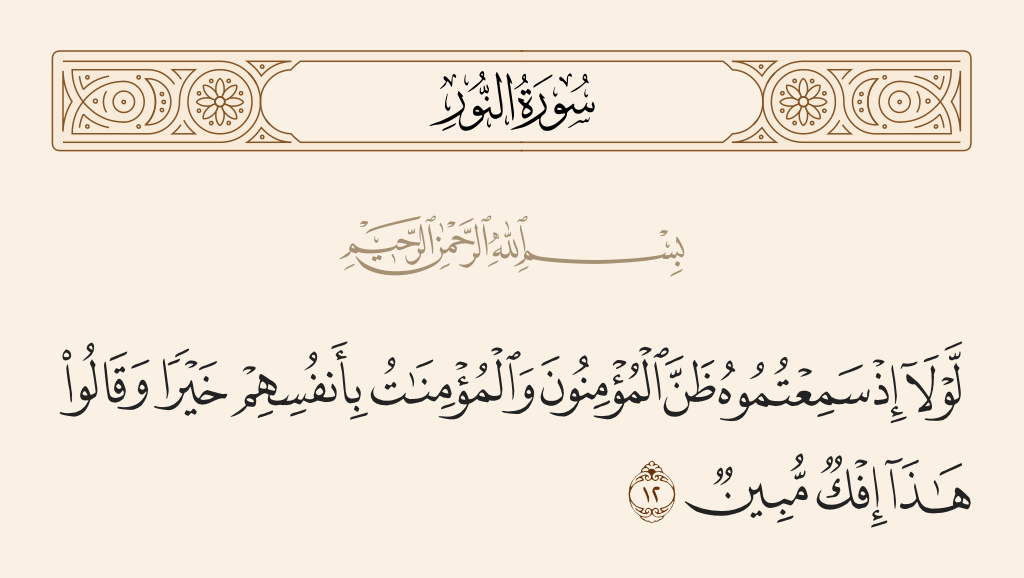Surat An-Nur Verse No. 12: Reading and listening
Translation of the verse 12 from Surah An-Nur : Number of verses 64 - - page 351 - Part 18.

﴾لَّوۡلَآ إِذۡ سَمِعۡتُمُوهُ ظَنَّ ٱلۡمُؤۡمِنُونَ وَٱلۡمُؤۡمِنَٰتُ بِأَنفُسِهِمۡ خَيۡرٗا وَقَالُواْ هَٰذَآ إِفۡكٞ مُّبِينٞ ﴿
[ النور: 12]
Why then, did not the believers, men and women, when you heard it (the slander) think good of their own people and say: "This (charge) is an obvious lie?"
English - Sahih International
Why, when you heard it, did not the believing men and believing women think good of one another and say, "This is an obvious falsehood"?
Tafheem-ul-Quran by Syed Abu-al-A'la Maududi
(24:12) When you heard of it, why didn't the Believing men and the Believing women have a good opinion of themselves, *12 and why did they not say, "This is a manifest slander?" *13
Tafheem-ul-Quran by Syed Abu-al-A'la Maududi
*12) This may also be translated as: "Why did they not have a good opinion of the people of their own community and society?" The words in the Text are comprehensive and contain a subtle meaning which should be understood well. What happened concerning Hadrat `A'ishah and Safwan bin Mu`attal was only this: A woman belonging to the caravan (apart from the fact that she was the Holy Prophet's wife) was left behind, and a man belonging to the same caravan, who was also left behind, chanced to see her and brought her on his camel to the camp. Now if a person alleges that when the two found themselves alone, they became involved in sin, the accusation would imply two other hypotheses: First, if the accuser himself (whether man or woman) had been there, he would certainly have availed of the rare opportunity and committed the sinful act, for he had never before chanced upon a person of the opposite sex in a situation like this. Second, the accuser's assessment of the moral condition of the society he belongs to is that in that society there is no man or woman who could possibly have abstained from sin in similar circumstances. This will be the case when it involves any one man and any one woman. But supposing if the man and the woman happened to belong to the same place, and the woman who was left behind by chance was the wife, or sister, or daughter of a friend, or a relative, or a neighbour, or an acquaintance of the man, the matter would become much more serious and grave. Then it would mean that the one who utters such an accusation has a very poor and degraded opinion of himself as well as of his society, which has nothing to do with morality and good sense. No gentleman can imagine that if he finds a woman belonging to the family of a friend, or a neighbour or an acquaintance, stranded on the way, the first thing he would do would be to molest and dishonour her, and then would think of escorting her home. But here the matter was a thousand times more serious. The lady was no other than the wife of the Holy Prophet of Allah, whom every Muslim esteemed higher than his own mother, and whom Allah Himself had forbidden for every Muslim just like his own mother. The man was not only a follower of the same caravan and a soldier of the same army, and an inhabitant of the same city, but also a Muslim, who believed in the lady's husband to be the Messenger of Allah and his religious leader and guide, and had even followed him and fought in the most dangerous battle at Badr. Viewed against this background, it would seem that the person who uttered such an accusation and those who considered the accusation as probable, formed a very poor opinion not only of their moral selves but also of the whole society.
*13) That is, `The accusation was not worth any consideration; the Muslims should have rejected it there and then as a lie and a falsehood." A question might be asked: Why did not the Holy Prophet and Hadrat Abu Bakr Siddiq reject it on the very first day, and why did they give it all that importance? The answer is that the position of the husband and the father is different from that of the common people. Though none else can know a woman better than her husband and a righteous husband cannot doubt the character of a virtuous and pious wife only on account of the people's accusations, but when the wife is accused, the husband is placed in a difficult situation. Even if he rejects it outright as a calumny, the accusers will not listen. They will rather say that the woman is clever and has beguiled the husband into believing that she is virtuous and pious whereas she is not. A similar situation is faced by the parents. They also cannot remove . the accusers' slander regarding their daughter's chastity even if they know that the accusation is manifestly false. The same thing had afflicted the Holy Prophet, Hadrat Abu Bakr and Umm Ruman, otherwise they did not entertain any doubt about Hadrat `A'ishah's character. That is why the Holy Prophet had declared in his sermon that he had neither seen any evil in his wife nor in the man who was being mentioned in the slander.